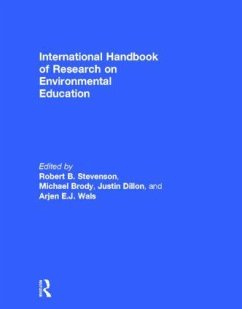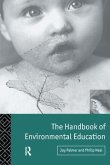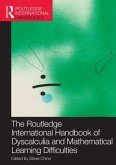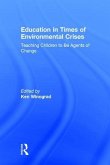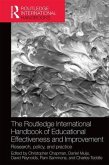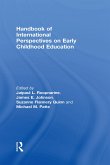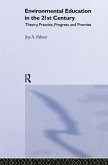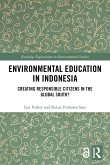International Handbook of Research on Environmental Education
Herausgeber: Stevenson, Robert B.; Dillon, Justin; Brody, Michael
International Handbook of Research on Environmental Education
Herausgeber: Stevenson, Robert B.; Dillon, Justin; Brody, Michael
- Gebundenes Buch
- Merkliste
- Auf die Merkliste
- Bewerten Bewerten
- Teilen
- Produkt teilen
- Produkterinnerung
- Produkterinnerung
The environment and contested notions of sustainability are increasingly topics of public interest, political debate, and legislation across the world. Environmental education journals now publish research from a wide variety of methodological traditions that show linkages between the environment, health, development, and education. The growth in scholarship makes this an opportune time to review and synthesize the knowledge base of the environmental education (EE) field. The purpose of this 51-chapter handbook is not only to illuminate the most important concepts, findings and theories that…mehr
Andere Kunden interessierten sich auch für
![The Handbook of Environmental Education The Handbook of Environmental Education]() Philip NealThe Handbook of Environmental Education317,99 €
Philip NealThe Handbook of Environmental Education317,99 €![The Routledge International Handbook of Dyscalculia and Mathematical Learning Difficulties The Routledge International Handbook of Dyscalculia and Mathematical Learning Difficulties]() The Routledge International Handbook of Dyscalculia and Mathematical Learning Difficulties329,99 €
The Routledge International Handbook of Dyscalculia and Mathematical Learning Difficulties329,99 €![Education in Times of Environmental Crises Education in Times of Environmental Crises]() Education in Times of Environmental Crises260,99 €
Education in Times of Environmental Crises260,99 €![The Routledge International Handbook of Educational Effectiveness and Improvement The Routledge International Handbook of Educational Effectiveness and Improvement]() The Routledge International Handbook of Educational Effectiveness and Improvement329,99 €
The Routledge International Handbook of Educational Effectiveness and Improvement329,99 €![Handbook of International Perspectives on Early Childhood Education Handbook of International Perspectives on Early Childhood Education]() Handbook of International Perspectives on Early Childhood Education393,99 €
Handbook of International Perspectives on Early Childhood Education393,99 €![Environmental Education in the 21st Century Environmental Education in the 21st Century]() Joy PalmerEnvironmental Education in the 21st Century356,99 €
Joy PalmerEnvironmental Education in the 21st Century356,99 €![Environmental Education in Indonesia Environmental Education in Indonesia]() Lyn ParkerEnvironmental Education in Indonesia205,99 €
Lyn ParkerEnvironmental Education in Indonesia205,99 €-
-
-
The environment and contested notions of sustainability are increasingly topics of public interest, political debate, and legislation across the world. Environmental education journals now publish research from a wide variety of methodological traditions that show linkages between the environment, health, development, and education. The growth in scholarship makes this an opportune time to review and synthesize the knowledge base of the environmental education (EE) field. The purpose of this 51-chapter handbook is not only to illuminate the most important concepts, findings and theories that have been developed by EE research, but also to critically examine the historical progression of the field, its current debates and controversies, what is still missing from the EE research agenda, and where that agenda might be headed. Published for the American Educational Research Association (AERA).
Hinweis: Dieser Artikel kann nur an eine deutsche Lieferadresse ausgeliefert werden.
Hinweis: Dieser Artikel kann nur an eine deutsche Lieferadresse ausgeliefert werden.
Produktdetails
- Produktdetails
- Verlag: Routledge
- Seitenzahl: 592
- Erscheinungstermin: 17. Dezember 2012
- Englisch
- Abmessung: 286mm x 221mm x 36mm
- Gewicht: 1728g
- ISBN-13: 9780415892384
- ISBN-10: 0415892384
- Artikelnr.: 32463831
- Herstellerkennzeichnung
- Libri GmbH
- Europaallee 1
- 36244 Bad Hersfeld
- gpsr@libri.de
- Verlag: Routledge
- Seitenzahl: 592
- Erscheinungstermin: 17. Dezember 2012
- Englisch
- Abmessung: 286mm x 221mm x 36mm
- Gewicht: 1728g
- ISBN-13: 9780415892384
- ISBN-10: 0415892384
- Artikelnr.: 32463831
- Herstellerkennzeichnung
- Libri GmbH
- Europaallee 1
- 36244 Bad Hersfeld
- gpsr@libri.de
Robert B. Stevenson is Professor and Tropical Research Leader (Environmental Sustainability Education) in The Cairns Institute and School of Education and Director of the Centre for Research and Innovation in Sustainability Education at James Cook University in Australia. He is an executive editor of the Journal of Environmental Education and has served on the editorial boards of all the major English language journals in environmental education. Bob's research has focused on the relationships among theory, policy and practice in environmental/ sustainability education and its history and marginalized status as an educational reform in K-12 schools. His current research interests focus on the current and potential spaces and approaches for learning about issues of sustainability and how schools, peers, and the electronic media are being used and can be constructively used to work toward a more sustainable and just society. Michael Brody is a faculty member in the College of Education, Health and Human Development at Montana State University, where he teaches courses in science, education and research at the graduate and undergraduate levels. He received his Ph.D. from Cornell University in science & environmental education, Master of Science in Biology from the University of New Hampshire and Bachelor of Science in Biology and Secondary Education from Boston College. He is a research associate of the Museum of the Rockies in Bozeman, Montana and received the North American Association of Environmental Education Outstanding Contributions to Research Award. Justin Dillon is Professor of Science and Environmental Education at King's College London. He is head of the Science and Technology Education Group and co-leader of the Centre for Research in Education in Science, Technology, Engineering and Mathematics. His research interests include science engagement in museums, science centres and botanic gardens, learning outside the classroom, students' interests and aspirations, and teacher identity and development. Justin was Chair of AERA's Ecological and Environmental Education special interest group from 1998-99. He was elected president of the European Science Education Research Association from 2007-11 and was elected a fellow of the Linnean Society of London in 2005. Arjen E.J. Wals is a Professor of Social Learning and Sustainable Development at Wageningen University in The Netherlands. He also holds an Adjunct Professorship at Cornell University and is a UNESCO Chair in the same field. His research focuses on learning processes that contribute to a more sustainable world. Wals obtained his PhD in 1991 with a Fulbright fellowship at the University of Michigan in Ann Arbor under the guidance of the late Bill Stapp, one of the founding fathers of the field of Environmental Education. Wals maintains a blog at www.transformativelearning.nl.
1. Introduction: An Orientation to Environmental Education and the Handbook
Part A. Conceptualizing Environmental Education as a Field of Inquiry
Section I. Historical, Contextual and Theoretical Orientations that have
Shaped Environmental Education Research: Introduction 2. The Emergence of
Environmental Education Research: A 'History' of the Field 3.
Socio-Ecological Approaches to Environmental Education and Research: A
Paradigmatic Response to Behavioral Change Orientations 4. Thinking
Globally in Environmental Education: A Critical History 5. Selected Trends
in Thirty Years of Doctoral Research in Environmental Education in
Dissertation Abstracts International from Collections Prepared in the
United States of America 6. Transformation, Empowerment, and the Governing
of Environmental Conduct: Insights to be Gained from an "History of the
Present" Approach Section II. Normative Dimensions of Environmental
Education Research: Conceptions of Education and Environmental Ethics 7.
Probing Normative Research in Environmental Education: Ideas about
Education and Ethics 8. Self, Environment, and Education: Normative
Arisings 9. A Critical Theory of Place-Conscious Education 10. Learning
from Hermit Crabs, Mycelia and Banyan: Schools as Centers of Critical
Inquiry and Re Normatization 11. Why We Need a Language of (Environmental)
Education 12. Environmental Ethics as Processes of Open-Ended, Pluralistic,
Deliberative Enquiry Section III. Analyses of EE Discourses and Policies,
Including their Cultural and Political Influences, at the International,
National, and/or Local Level 13. The Politics of Needs and Sustainability
Education 14. Languages and Discourses of Education, Environment and
Sustainable Development 15. Researching Tensions and Pretensions in
Environmental/Sustainability Education Policies: From Critical to Civically
Engaged Policy Scholarship 16. Changing Discourses in EE/ESD: A Role for
Professional Self -Development 17. Connecting Vocational and Technical
Education with Sustainability 18. Trends, Junctures and Disjunctures in
Latin American Environmental Education Research Edgar 19. EE Policies in
Three Chinese Communities: Challenges and Prospects for Future Development
Part B. Research on Environmental Education Curriculum, Learning, and
Assessment: Processes and Outcomes Section IV. Introduction to Curriculum
(and Pedagogical?) Research in EE 20. Traditions and New Niches: An
Overview of Environmental Education Curriculum and Learning Research 21.
Environmental Education in a Cultural Context 22. Place-based Education:
Practice and Impacts 23. Getting the Picture: From the Old
Reflection-Hearing Pictures and Telling Tales, to the New Reflection-Seeing
Voices and Painting Scenes 24. Moinho D'Água: Environmental Education,
Participation and Autonomy in Rural Areas Section V. Research on Learning
Processes in Environmental Education 25. Environmental Learning: Insights
from Research into the Student Experience 26. Conventional and Emerging
Learning Theories: Implications and Choices for Educational Researchers
with a Planetary Consciousness 27. Belief to Behavior: A Vital Link 28.
Landscapes as Contexts for Learning Section VI. Evaluation and Analysis of
Environmental Education Programs, Materials, and Technologies and the
Assessment of Learners and Learning 29. Research on the Long-Term Impacts
of Environmental Education 30. Advancing Environmental Education Program
Evaluation: Insights from a Review of Behavioral Outcome Evaluations 31.
National Assessments of Environmental Literacy: A Review, Comparison, and
Analysis 32. Geospatial Technologies: The Present and Future Roles of
Emerging Technologies in Environmental Education 33. Sustainability
Education: Theory and Practice 34. Learning from Neighboring Fields:
Conceptualizing Outcomes of Environmental Education within the Framework of
Free-Choice Learning Experiences Part C. Issues of Framing, Doing and the
Missing in Environmental Education Research Section VII. Moving Margins in
Environmental Education Research 35. Researching Differently: Generating a
Gender Agenda for Research in Environmental Education 36. The
Representation of Indigenous Knowledges 37. Educating for Environmental
Justice 38. Indigenous Environmental Education Research in North America: A
Brief Review 39. Three Degrees of Separation: Accounting for Naturecultures
in Environmental Education Research Section VIII. Philosophical and
Methodological Perspectives 40. (Un)timely Ecophenomenological Framings of
Environmental Education Research 41. Children as Active Researchers: The
Potential of Environmental Education Research Involving Children 42.
Collaborative Ecological Inquiry: Where Action Research Meets Sustainable
Development 43. Action Research and Environmental Education: Conceptual
Congruencies and the Imperatives of Context and Participation 44. A
Feminist Poststructural Approach to Environmental Education Research 45.
Suited: Relational Learning and Socio-Ecological Pedagogies 46. Greening
the Knowledge Economy: Ecosophy, Ecology and Economy 47. Preconceptions and
Positionings: Can We See Ourselves Within Our Own Terrain? Section IX.
Insights, Gaps and Future Directions in Environmental Education Research
48. Situating the Handbook in the Evolving Characteristics of Environmental
Education Research 49. Identifying Needs in Environmental Education
Research 50. Handbooks of Environmental Education Research: For Further
Reading and Writing 51. Tentative Directions for Environmental Education
Research in Uncertain Times
Part A. Conceptualizing Environmental Education as a Field of Inquiry
Section I. Historical, Contextual and Theoretical Orientations that have
Shaped Environmental Education Research: Introduction 2. The Emergence of
Environmental Education Research: A 'History' of the Field 3.
Socio-Ecological Approaches to Environmental Education and Research: A
Paradigmatic Response to Behavioral Change Orientations 4. Thinking
Globally in Environmental Education: A Critical History 5. Selected Trends
in Thirty Years of Doctoral Research in Environmental Education in
Dissertation Abstracts International from Collections Prepared in the
United States of America 6. Transformation, Empowerment, and the Governing
of Environmental Conduct: Insights to be Gained from an "History of the
Present" Approach Section II. Normative Dimensions of Environmental
Education Research: Conceptions of Education and Environmental Ethics 7.
Probing Normative Research in Environmental Education: Ideas about
Education and Ethics 8. Self, Environment, and Education: Normative
Arisings 9. A Critical Theory of Place-Conscious Education 10. Learning
from Hermit Crabs, Mycelia and Banyan: Schools as Centers of Critical
Inquiry and Re Normatization 11. Why We Need a Language of (Environmental)
Education 12. Environmental Ethics as Processes of Open-Ended, Pluralistic,
Deliberative Enquiry Section III. Analyses of EE Discourses and Policies,
Including their Cultural and Political Influences, at the International,
National, and/or Local Level 13. The Politics of Needs and Sustainability
Education 14. Languages and Discourses of Education, Environment and
Sustainable Development 15. Researching Tensions and Pretensions in
Environmental/Sustainability Education Policies: From Critical to Civically
Engaged Policy Scholarship 16. Changing Discourses in EE/ESD: A Role for
Professional Self -Development 17. Connecting Vocational and Technical
Education with Sustainability 18. Trends, Junctures and Disjunctures in
Latin American Environmental Education Research Edgar 19. EE Policies in
Three Chinese Communities: Challenges and Prospects for Future Development
Part B. Research on Environmental Education Curriculum, Learning, and
Assessment: Processes and Outcomes Section IV. Introduction to Curriculum
(and Pedagogical?) Research in EE 20. Traditions and New Niches: An
Overview of Environmental Education Curriculum and Learning Research 21.
Environmental Education in a Cultural Context 22. Place-based Education:
Practice and Impacts 23. Getting the Picture: From the Old
Reflection-Hearing Pictures and Telling Tales, to the New Reflection-Seeing
Voices and Painting Scenes 24. Moinho D'Água: Environmental Education,
Participation and Autonomy in Rural Areas Section V. Research on Learning
Processes in Environmental Education 25. Environmental Learning: Insights
from Research into the Student Experience 26. Conventional and Emerging
Learning Theories: Implications and Choices for Educational Researchers
with a Planetary Consciousness 27. Belief to Behavior: A Vital Link 28.
Landscapes as Contexts for Learning Section VI. Evaluation and Analysis of
Environmental Education Programs, Materials, and Technologies and the
Assessment of Learners and Learning 29. Research on the Long-Term Impacts
of Environmental Education 30. Advancing Environmental Education Program
Evaluation: Insights from a Review of Behavioral Outcome Evaluations 31.
National Assessments of Environmental Literacy: A Review, Comparison, and
Analysis 32. Geospatial Technologies: The Present and Future Roles of
Emerging Technologies in Environmental Education 33. Sustainability
Education: Theory and Practice 34. Learning from Neighboring Fields:
Conceptualizing Outcomes of Environmental Education within the Framework of
Free-Choice Learning Experiences Part C. Issues of Framing, Doing and the
Missing in Environmental Education Research Section VII. Moving Margins in
Environmental Education Research 35. Researching Differently: Generating a
Gender Agenda for Research in Environmental Education 36. The
Representation of Indigenous Knowledges 37. Educating for Environmental
Justice 38. Indigenous Environmental Education Research in North America: A
Brief Review 39. Three Degrees of Separation: Accounting for Naturecultures
in Environmental Education Research Section VIII. Philosophical and
Methodological Perspectives 40. (Un)timely Ecophenomenological Framings of
Environmental Education Research 41. Children as Active Researchers: The
Potential of Environmental Education Research Involving Children 42.
Collaborative Ecological Inquiry: Where Action Research Meets Sustainable
Development 43. Action Research and Environmental Education: Conceptual
Congruencies and the Imperatives of Context and Participation 44. A
Feminist Poststructural Approach to Environmental Education Research 45.
Suited: Relational Learning and Socio-Ecological Pedagogies 46. Greening
the Knowledge Economy: Ecosophy, Ecology and Economy 47. Preconceptions and
Positionings: Can We See Ourselves Within Our Own Terrain? Section IX.
Insights, Gaps and Future Directions in Environmental Education Research
48. Situating the Handbook in the Evolving Characteristics of Environmental
Education Research 49. Identifying Needs in Environmental Education
Research 50. Handbooks of Environmental Education Research: For Further
Reading and Writing 51. Tentative Directions for Environmental Education
Research in Uncertain Times
1. Introduction: An Orientation to Environmental Education and the Handbook
Part A. Conceptualizing Environmental Education as a Field of Inquiry
Section I. Historical, Contextual and Theoretical Orientations that have
Shaped Environmental Education Research: Introduction 2. The Emergence of
Environmental Education Research: A 'History' of the Field 3.
Socio-Ecological Approaches to Environmental Education and Research: A
Paradigmatic Response to Behavioral Change Orientations 4. Thinking
Globally in Environmental Education: A Critical History 5. Selected Trends
in Thirty Years of Doctoral Research in Environmental Education in
Dissertation Abstracts International from Collections Prepared in the
United States of America 6. Transformation, Empowerment, and the Governing
of Environmental Conduct: Insights to be Gained from an "History of the
Present" Approach Section II. Normative Dimensions of Environmental
Education Research: Conceptions of Education and Environmental Ethics 7.
Probing Normative Research in Environmental Education: Ideas about
Education and Ethics 8. Self, Environment, and Education: Normative
Arisings 9. A Critical Theory of Place-Conscious Education 10. Learning
from Hermit Crabs, Mycelia and Banyan: Schools as Centers of Critical
Inquiry and Re Normatization 11. Why We Need a Language of (Environmental)
Education 12. Environmental Ethics as Processes of Open-Ended, Pluralistic,
Deliberative Enquiry Section III. Analyses of EE Discourses and Policies,
Including their Cultural and Political Influences, at the International,
National, and/or Local Level 13. The Politics of Needs and Sustainability
Education 14. Languages and Discourses of Education, Environment and
Sustainable Development 15. Researching Tensions and Pretensions in
Environmental/Sustainability Education Policies: From Critical to Civically
Engaged Policy Scholarship 16. Changing Discourses in EE/ESD: A Role for
Professional Self -Development 17. Connecting Vocational and Technical
Education with Sustainability 18. Trends, Junctures and Disjunctures in
Latin American Environmental Education Research Edgar 19. EE Policies in
Three Chinese Communities: Challenges and Prospects for Future Development
Part B. Research on Environmental Education Curriculum, Learning, and
Assessment: Processes and Outcomes Section IV. Introduction to Curriculum
(and Pedagogical?) Research in EE 20. Traditions and New Niches: An
Overview of Environmental Education Curriculum and Learning Research 21.
Environmental Education in a Cultural Context 22. Place-based Education:
Practice and Impacts 23. Getting the Picture: From the Old
Reflection-Hearing Pictures and Telling Tales, to the New Reflection-Seeing
Voices and Painting Scenes 24. Moinho D'Água: Environmental Education,
Participation and Autonomy in Rural Areas Section V. Research on Learning
Processes in Environmental Education 25. Environmental Learning: Insights
from Research into the Student Experience 26. Conventional and Emerging
Learning Theories: Implications and Choices for Educational Researchers
with a Planetary Consciousness 27. Belief to Behavior: A Vital Link 28.
Landscapes as Contexts for Learning Section VI. Evaluation and Analysis of
Environmental Education Programs, Materials, and Technologies and the
Assessment of Learners and Learning 29. Research on the Long-Term Impacts
of Environmental Education 30. Advancing Environmental Education Program
Evaluation: Insights from a Review of Behavioral Outcome Evaluations 31.
National Assessments of Environmental Literacy: A Review, Comparison, and
Analysis 32. Geospatial Technologies: The Present and Future Roles of
Emerging Technologies in Environmental Education 33. Sustainability
Education: Theory and Practice 34. Learning from Neighboring Fields:
Conceptualizing Outcomes of Environmental Education within the Framework of
Free-Choice Learning Experiences Part C. Issues of Framing, Doing and the
Missing in Environmental Education Research Section VII. Moving Margins in
Environmental Education Research 35. Researching Differently: Generating a
Gender Agenda for Research in Environmental Education 36. The
Representation of Indigenous Knowledges 37. Educating for Environmental
Justice 38. Indigenous Environmental Education Research in North America: A
Brief Review 39. Three Degrees of Separation: Accounting for Naturecultures
in Environmental Education Research Section VIII. Philosophical and
Methodological Perspectives 40. (Un)timely Ecophenomenological Framings of
Environmental Education Research 41. Children as Active Researchers: The
Potential of Environmental Education Research Involving Children 42.
Collaborative Ecological Inquiry: Where Action Research Meets Sustainable
Development 43. Action Research and Environmental Education: Conceptual
Congruencies and the Imperatives of Context and Participation 44. A
Feminist Poststructural Approach to Environmental Education Research 45.
Suited: Relational Learning and Socio-Ecological Pedagogies 46. Greening
the Knowledge Economy: Ecosophy, Ecology and Economy 47. Preconceptions and
Positionings: Can We See Ourselves Within Our Own Terrain? Section IX.
Insights, Gaps and Future Directions in Environmental Education Research
48. Situating the Handbook in the Evolving Characteristics of Environmental
Education Research 49. Identifying Needs in Environmental Education
Research 50. Handbooks of Environmental Education Research: For Further
Reading and Writing 51. Tentative Directions for Environmental Education
Research in Uncertain Times
Part A. Conceptualizing Environmental Education as a Field of Inquiry
Section I. Historical, Contextual and Theoretical Orientations that have
Shaped Environmental Education Research: Introduction 2. The Emergence of
Environmental Education Research: A 'History' of the Field 3.
Socio-Ecological Approaches to Environmental Education and Research: A
Paradigmatic Response to Behavioral Change Orientations 4. Thinking
Globally in Environmental Education: A Critical History 5. Selected Trends
in Thirty Years of Doctoral Research in Environmental Education in
Dissertation Abstracts International from Collections Prepared in the
United States of America 6. Transformation, Empowerment, and the Governing
of Environmental Conduct: Insights to be Gained from an "History of the
Present" Approach Section II. Normative Dimensions of Environmental
Education Research: Conceptions of Education and Environmental Ethics 7.
Probing Normative Research in Environmental Education: Ideas about
Education and Ethics 8. Self, Environment, and Education: Normative
Arisings 9. A Critical Theory of Place-Conscious Education 10. Learning
from Hermit Crabs, Mycelia and Banyan: Schools as Centers of Critical
Inquiry and Re Normatization 11. Why We Need a Language of (Environmental)
Education 12. Environmental Ethics as Processes of Open-Ended, Pluralistic,
Deliberative Enquiry Section III. Analyses of EE Discourses and Policies,
Including their Cultural and Political Influences, at the International,
National, and/or Local Level 13. The Politics of Needs and Sustainability
Education 14. Languages and Discourses of Education, Environment and
Sustainable Development 15. Researching Tensions and Pretensions in
Environmental/Sustainability Education Policies: From Critical to Civically
Engaged Policy Scholarship 16. Changing Discourses in EE/ESD: A Role for
Professional Self -Development 17. Connecting Vocational and Technical
Education with Sustainability 18. Trends, Junctures and Disjunctures in
Latin American Environmental Education Research Edgar 19. EE Policies in
Three Chinese Communities: Challenges and Prospects for Future Development
Part B. Research on Environmental Education Curriculum, Learning, and
Assessment: Processes and Outcomes Section IV. Introduction to Curriculum
(and Pedagogical?) Research in EE 20. Traditions and New Niches: An
Overview of Environmental Education Curriculum and Learning Research 21.
Environmental Education in a Cultural Context 22. Place-based Education:
Practice and Impacts 23. Getting the Picture: From the Old
Reflection-Hearing Pictures and Telling Tales, to the New Reflection-Seeing
Voices and Painting Scenes 24. Moinho D'Água: Environmental Education,
Participation and Autonomy in Rural Areas Section V. Research on Learning
Processes in Environmental Education 25. Environmental Learning: Insights
from Research into the Student Experience 26. Conventional and Emerging
Learning Theories: Implications and Choices for Educational Researchers
with a Planetary Consciousness 27. Belief to Behavior: A Vital Link 28.
Landscapes as Contexts for Learning Section VI. Evaluation and Analysis of
Environmental Education Programs, Materials, and Technologies and the
Assessment of Learners and Learning 29. Research on the Long-Term Impacts
of Environmental Education 30. Advancing Environmental Education Program
Evaluation: Insights from a Review of Behavioral Outcome Evaluations 31.
National Assessments of Environmental Literacy: A Review, Comparison, and
Analysis 32. Geospatial Technologies: The Present and Future Roles of
Emerging Technologies in Environmental Education 33. Sustainability
Education: Theory and Practice 34. Learning from Neighboring Fields:
Conceptualizing Outcomes of Environmental Education within the Framework of
Free-Choice Learning Experiences Part C. Issues of Framing, Doing and the
Missing in Environmental Education Research Section VII. Moving Margins in
Environmental Education Research 35. Researching Differently: Generating a
Gender Agenda for Research in Environmental Education 36. The
Representation of Indigenous Knowledges 37. Educating for Environmental
Justice 38. Indigenous Environmental Education Research in North America: A
Brief Review 39. Three Degrees of Separation: Accounting for Naturecultures
in Environmental Education Research Section VIII. Philosophical and
Methodological Perspectives 40. (Un)timely Ecophenomenological Framings of
Environmental Education Research 41. Children as Active Researchers: The
Potential of Environmental Education Research Involving Children 42.
Collaborative Ecological Inquiry: Where Action Research Meets Sustainable
Development 43. Action Research and Environmental Education: Conceptual
Congruencies and the Imperatives of Context and Participation 44. A
Feminist Poststructural Approach to Environmental Education Research 45.
Suited: Relational Learning and Socio-Ecological Pedagogies 46. Greening
the Knowledge Economy: Ecosophy, Ecology and Economy 47. Preconceptions and
Positionings: Can We See Ourselves Within Our Own Terrain? Section IX.
Insights, Gaps and Future Directions in Environmental Education Research
48. Situating the Handbook in the Evolving Characteristics of Environmental
Education Research 49. Identifying Needs in Environmental Education
Research 50. Handbooks of Environmental Education Research: For Further
Reading and Writing 51. Tentative Directions for Environmental Education
Research in Uncertain Times

